This post is part of a series introducing IntelliBuilder, our drag-and-drop survey editor. Below,...
In the landscape of modern employment, remote work has emerged as a defining trend over the last five years. As the workforce adapts to the virtual office revolution, one aspect often overlooked is the striking generational differences that influence how individuals approach the remote work experience.
Remote Work Study
IntelliSurvey recently conducted a study to delve into the intricacies of remote work, exploring overall satisfaction and outlooks among virtual employees. Using IS Pro, our proprietary survey platform, we interviewed 500 remote workers in the U.S., evenly distributed between Remote Veterans (already working remotely before the COVID-19 pandemic) and Digital Converts (began working remotely during or after the pandemic).
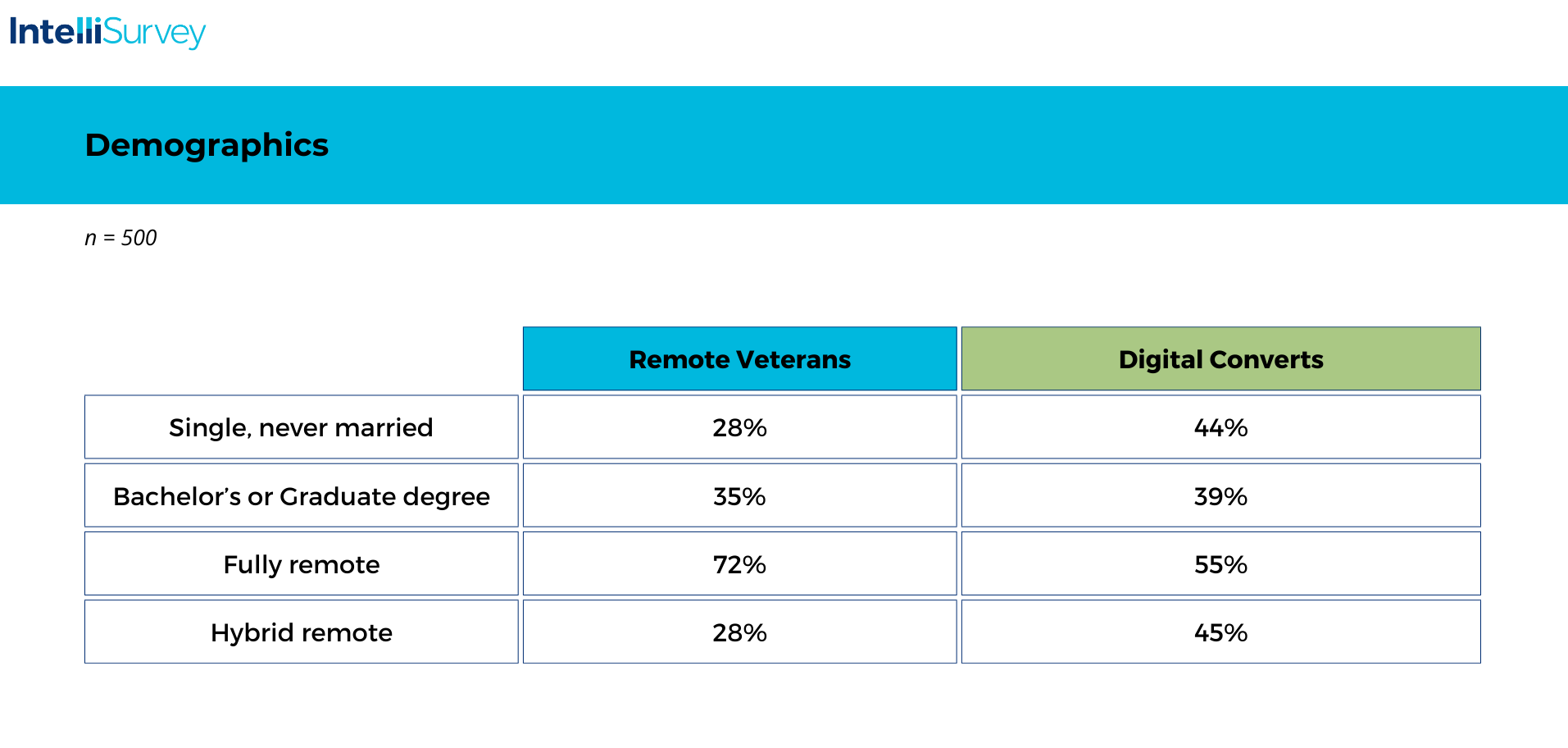
An Unexpected Turn: Generational Insights
While we didn’t propose any theories about generational differences specifically, our findings defied conventional expectations and aligned more closely with age and experience than technological familiarity.
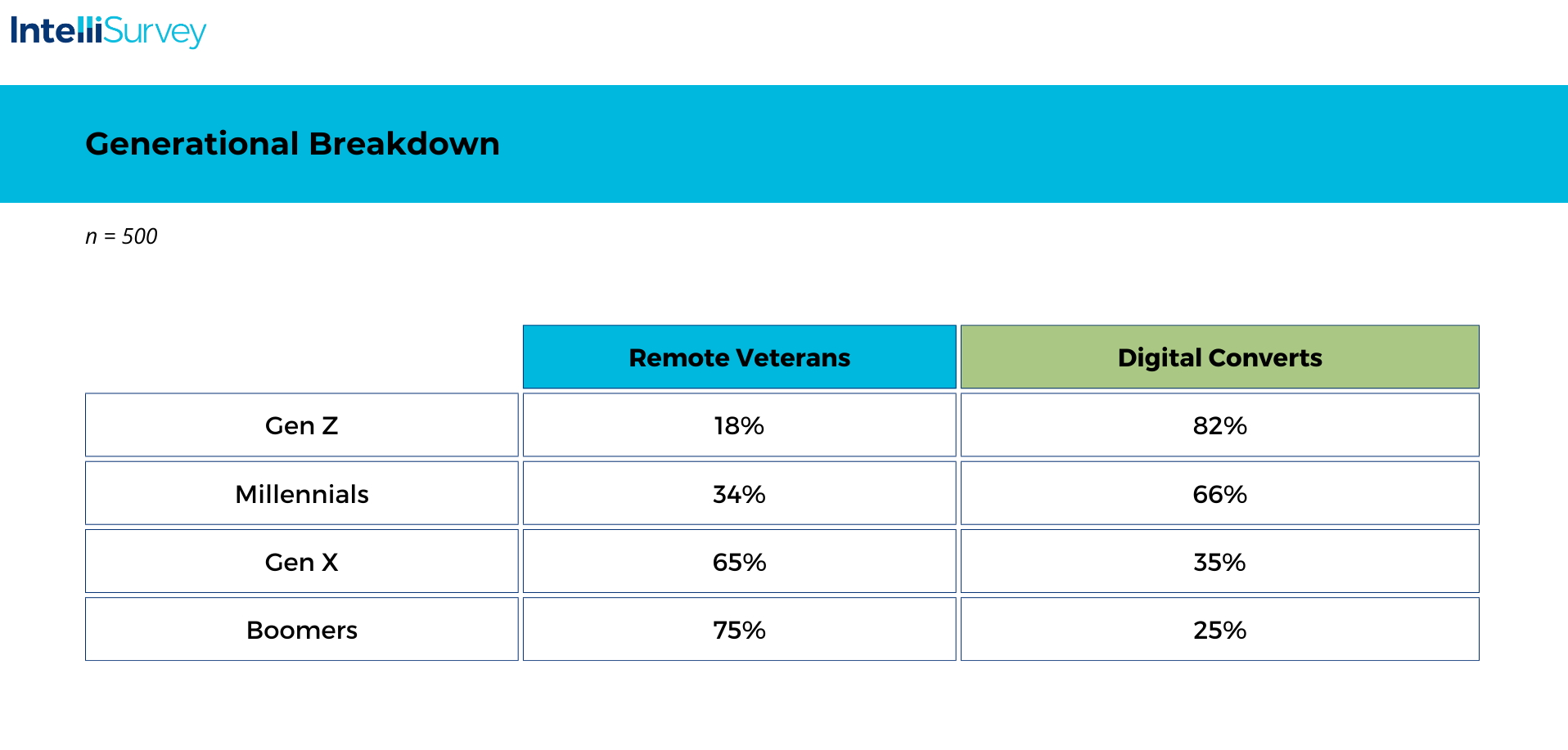
Gen Z vs. Boomers
Despite Gen Z’s higher number of Digital Converts, it stands to reason that the generation that grew up with technology would be more likely to embrace remote work. Surprisingly, NPS Scores tell a different story. Younger respondents were significantly less likely to recommend remote work than their older counterparts.
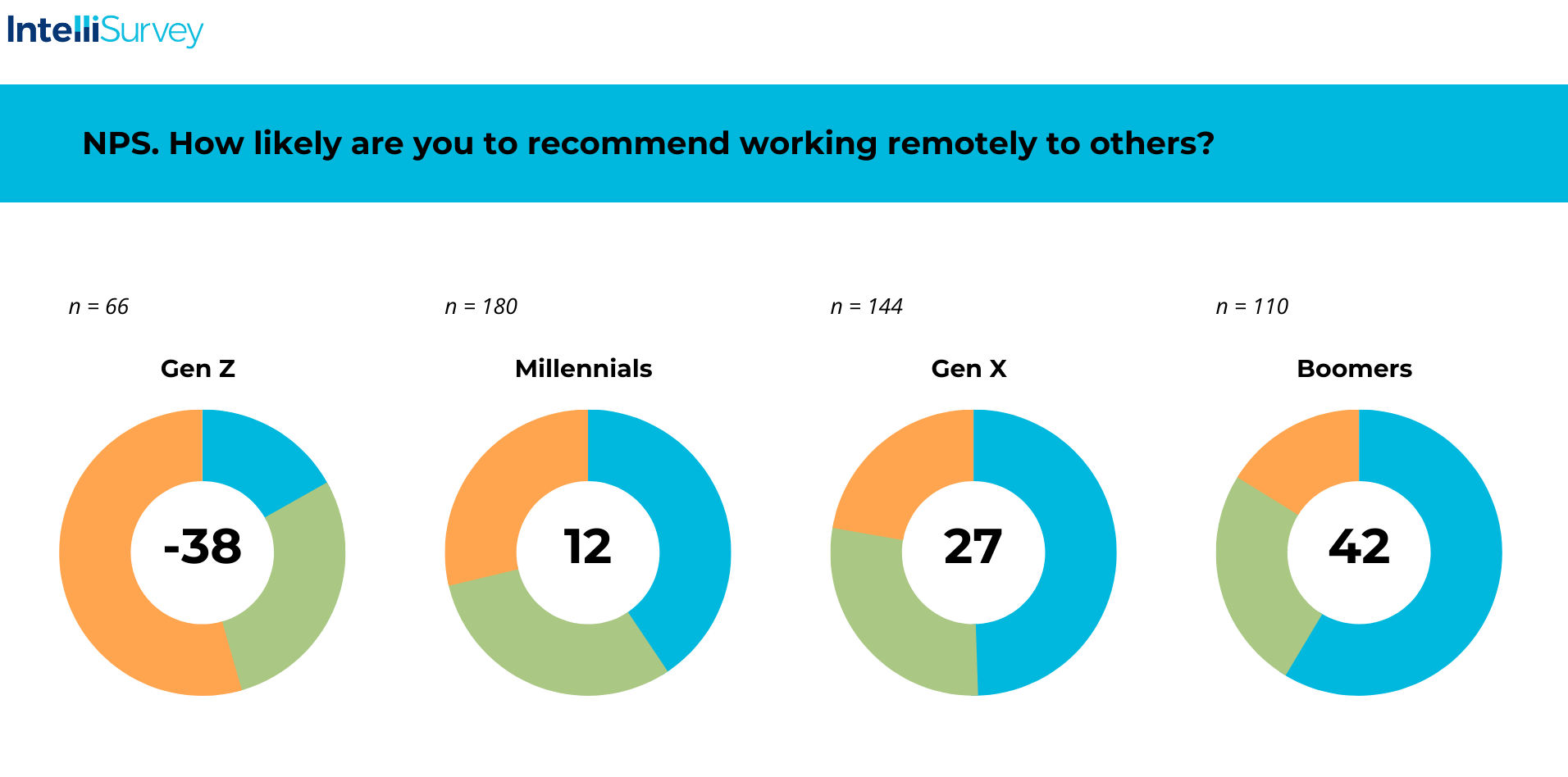
Boomers are 1) more likely to be promoters and 2) less likely to be detractors than any other generational group. While we’re not sure of the cause, we know that many of our Gen X and Boomer respondents were already working remotely before the pandemic, a choice they made to move away from a traditional office environment. This is likely a rejection of conventional office environments and may be seen as a much-needed cubicle escape. Gen Z and Millennials, in contrast, may resent a forced move to remote work and crave the connections facilitated by in-person interactions.
Older Generations Embrace Remote Work While Younger Workers Struggle
Contrary to the assumption that Boomers, with less familiarity with remote tools and technology, would be the least satisfied with remote work, the data revealed an astonishing twist. Boomers reported the highest levels of positivity about remote work, with 90% expressing a very positive or somewhat positive experience. Following them were Gen X (87%), Millennials (75%), and finally, Gen Z (58%).
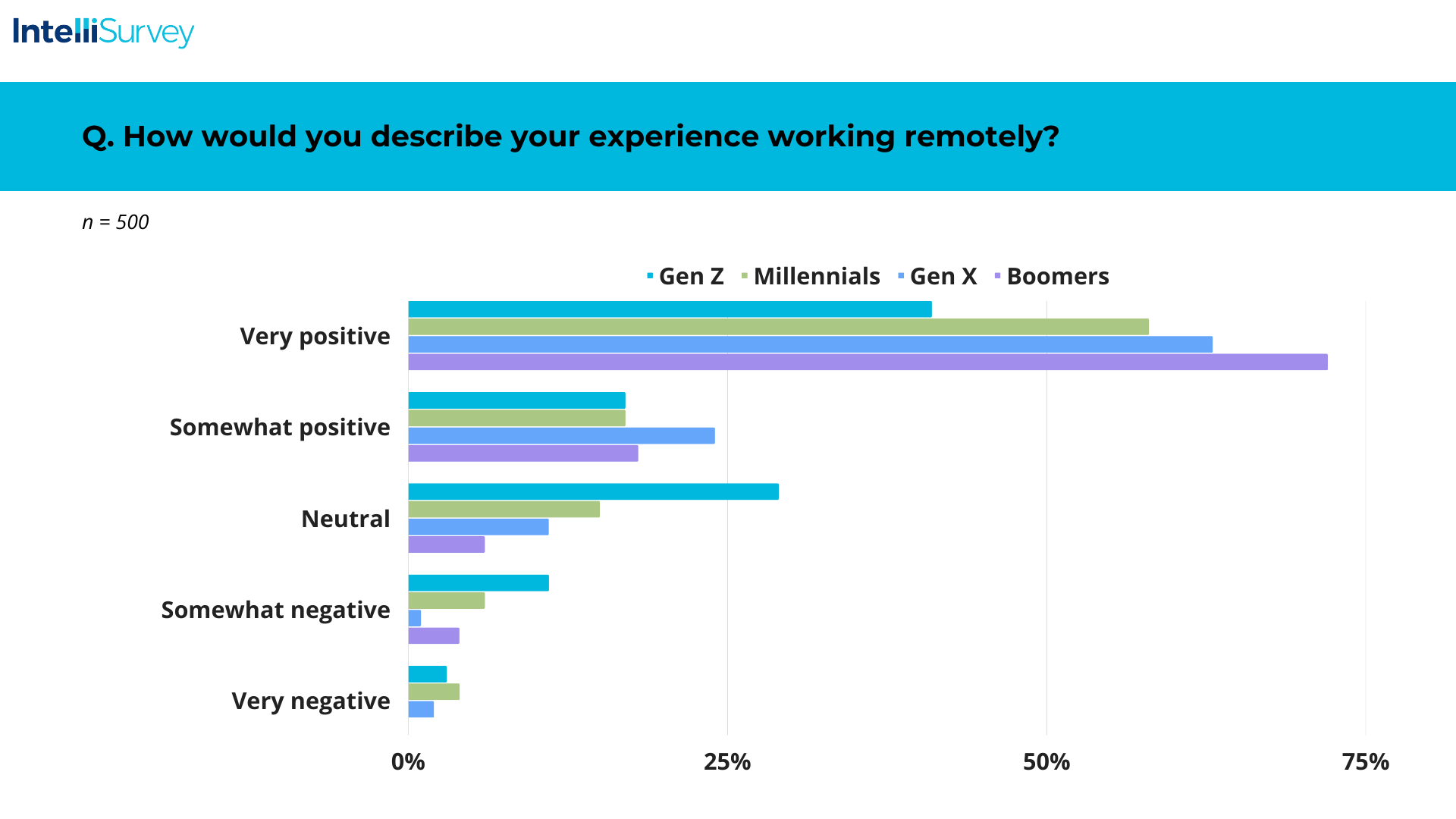
Why is Gen Z Struggling With Remote Work?
When it comes to struggles with remote work, Gen Z’s top two were tied between “Distractions with household chores/responsibilities” (76%) and “Working outside of traditional hours” (76%).
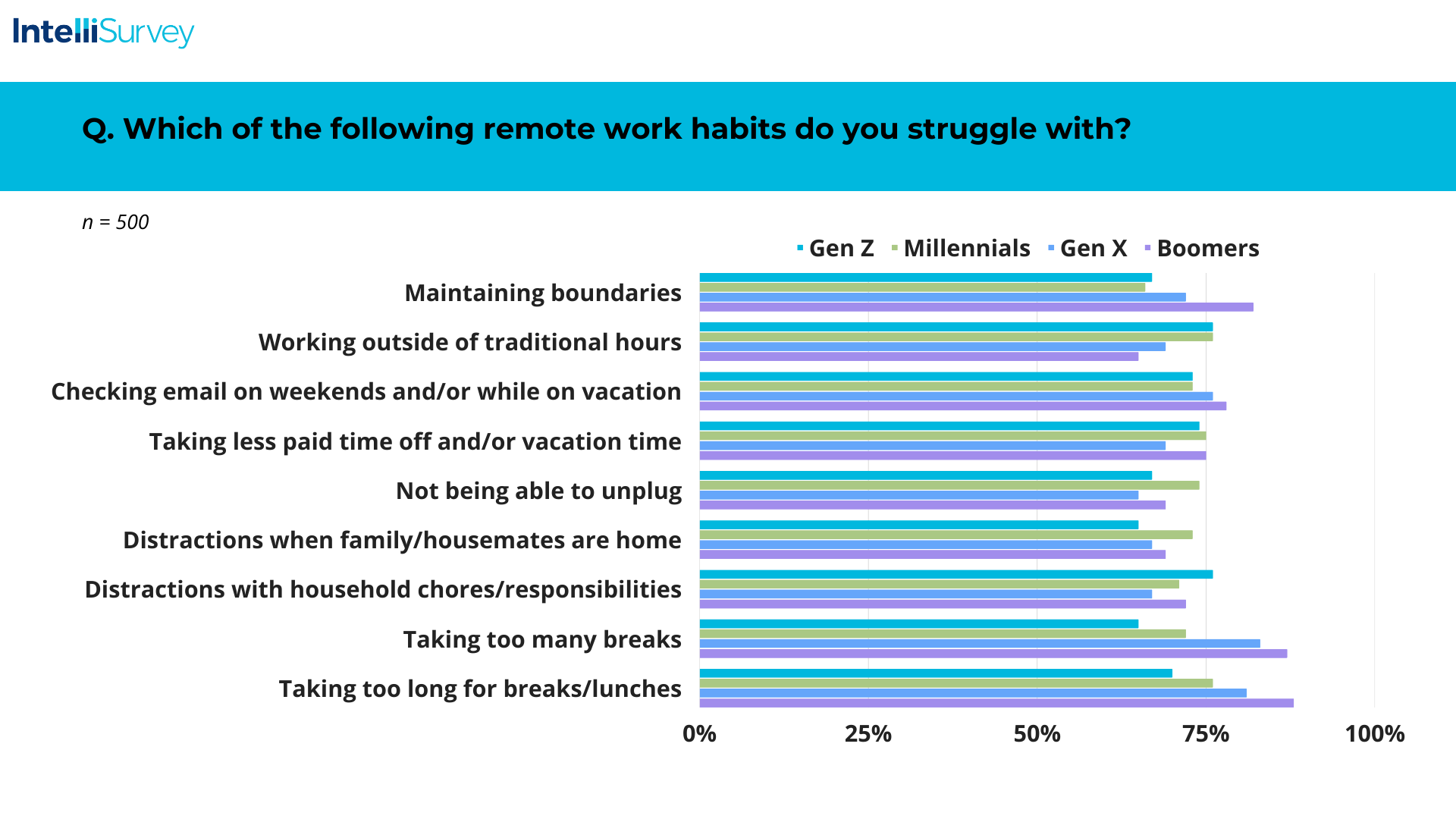
While Gen Z grew up in the digital age, they are new to the workforce and don’t have much experience compared to their older counterparts. Their current remote role may even be their first job. They are still learning to develop healthy home office habits, and learning how to be productive on their own likely contributes to their lower satisfaction with remote work overall.
Conversely, Gen X and Boomers have had decades of experience working in traditional office environments, which likely provided structure and boundaries to offset the struggles of working from home. Gen X and Boomers grappled most with “taking too long for lunches/breaks” (81% and 88%, respectively) and “taking too many breaks (83% and 88%), likely a result of moving from a company-imposed time limit to the freedom of choosing their own schedule and hours.
Do the Benefits Outweigh the Struggles?
Interestingly, Gen Z rated flexible hours/how you spend your time as the top benefit of working remotely, which conflicts with their self-stated struggles with working outside traditional hours. This may be due to the idea that flexibility can be both a blessing and a curse.
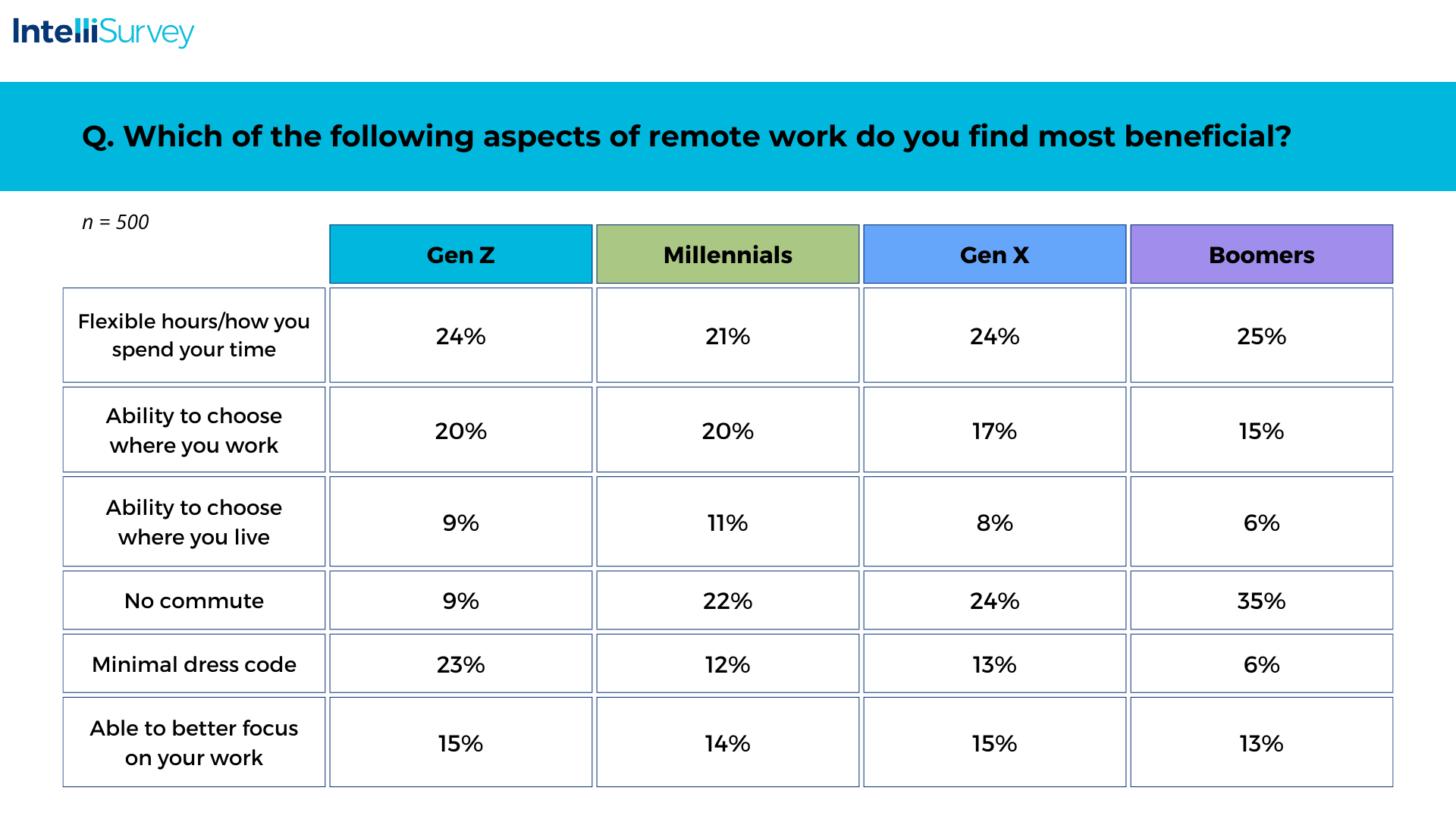
Boomers also rated flexible hours high on their list of benefits (25%), though that was beaten significantly by no commute (35%). This goes back to the length of careers - if you worked in a traditional office setting for years and had to deal with a daily commute, it’s easier to appreciate this benefit than if you’ve never had office experience.
Health May Be a Major Factor
When asked about healthy vs. unhealthy aspects of their current work situation, Gen Z had the lowest rating for work/life balance, with only 59% rating their experience as very or somewhat healthy. By contrast, Millennials (66%), Gen X (64%), and Boomers (75%) all rated their very/somewhat healthy experiences higher.
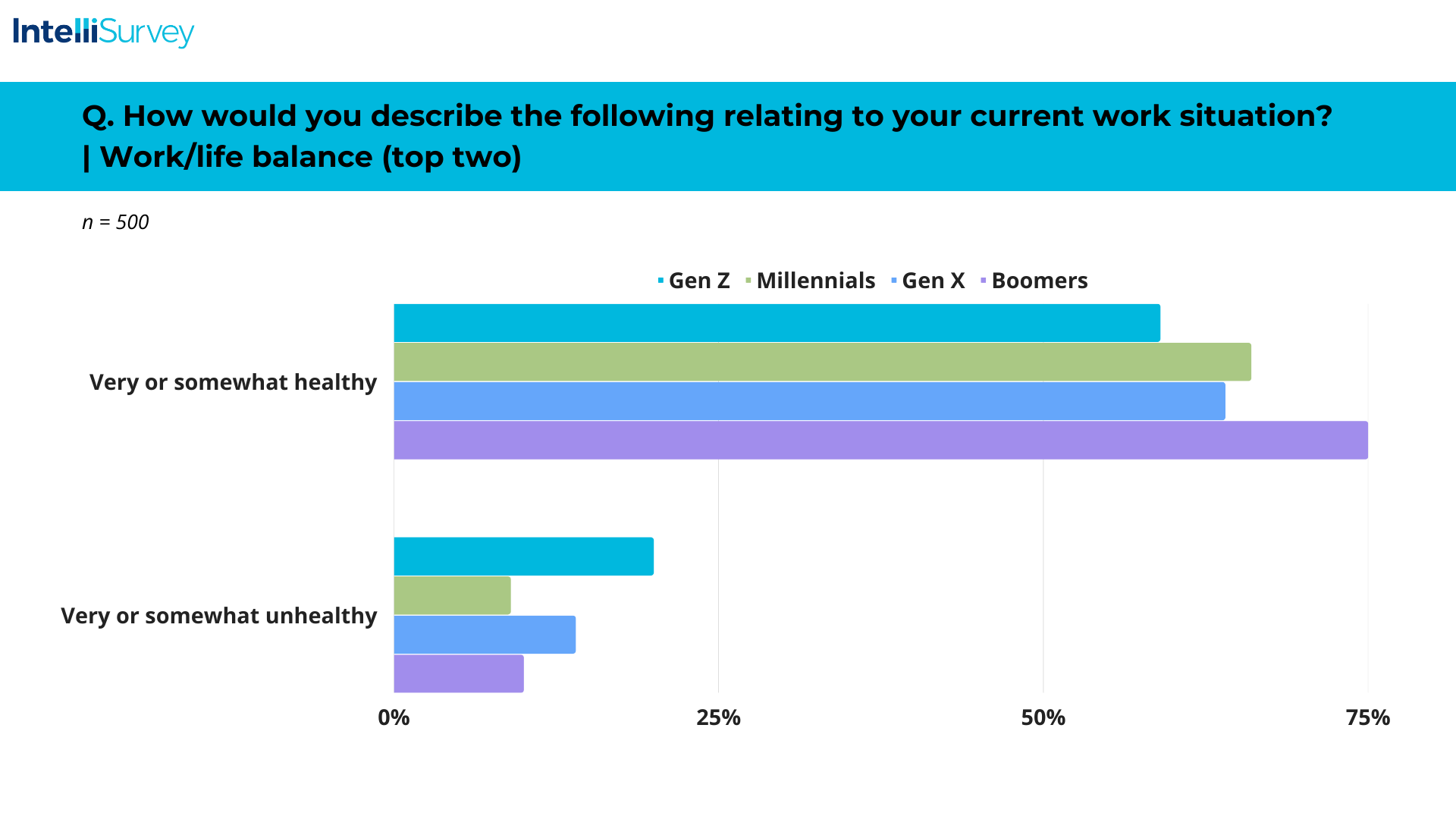
A similar spread was noted for mental health, again with Gen Z rating their health lower than any other generation. Mental health plays a crucial role in our daily lives, and it stands to reason that the lower rating for healthiness correlates with Gen Z’s dissatisfaction with working from home.
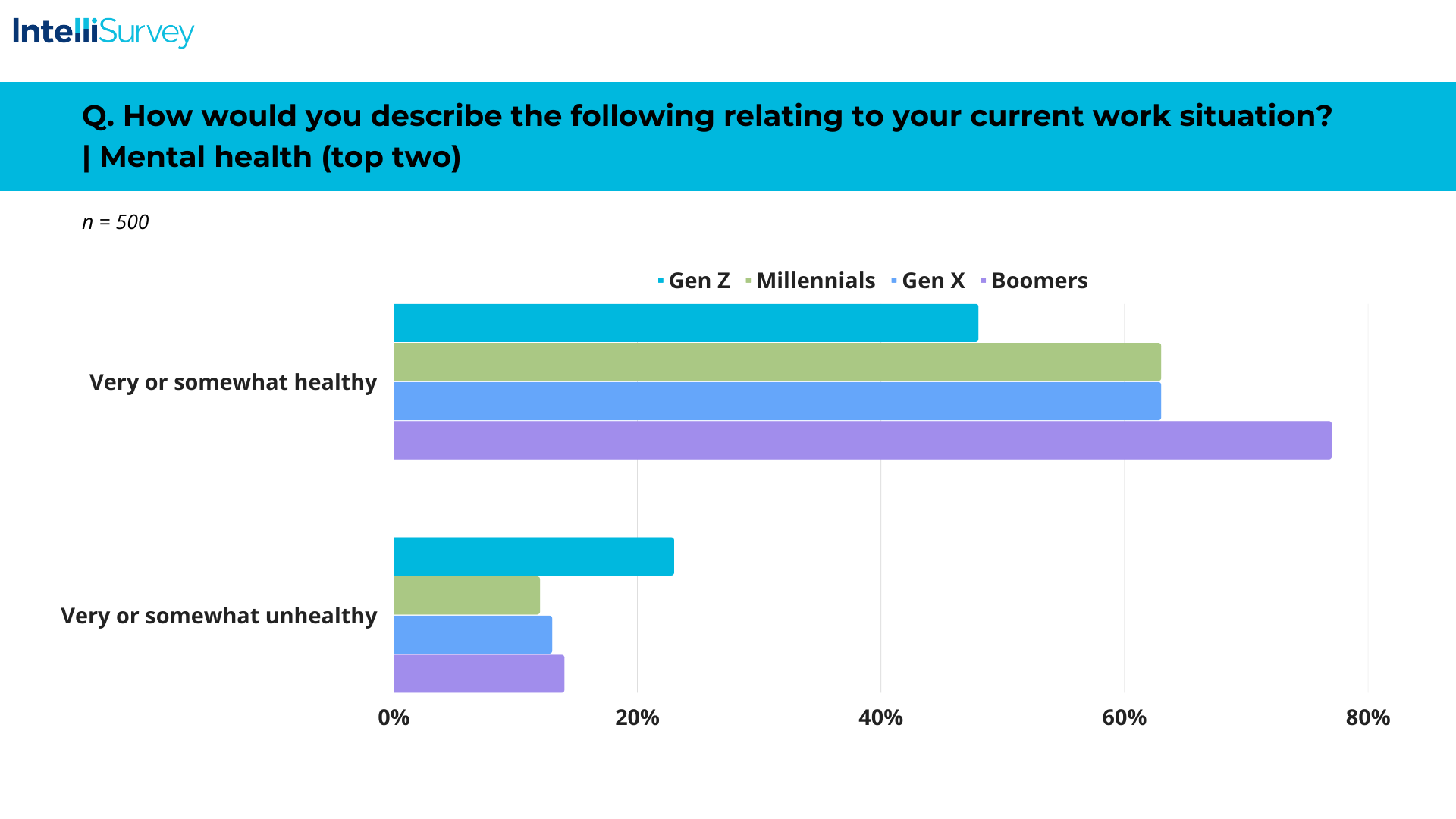
Career Growth Prospects
We were curious about other generational differences - why might older generations be more content working remotely indefinitely? One hypothesis was around career growth - younger generations, just starting their careers and already displeased with their remote employment arrangements, might view remote work as a hindrance in climbing the corporate ladder. The data showed the opposite: younger generations felt advancement was easier as remote workers. This optimism may result from increasing remote roles available as employers try to attract new talent.
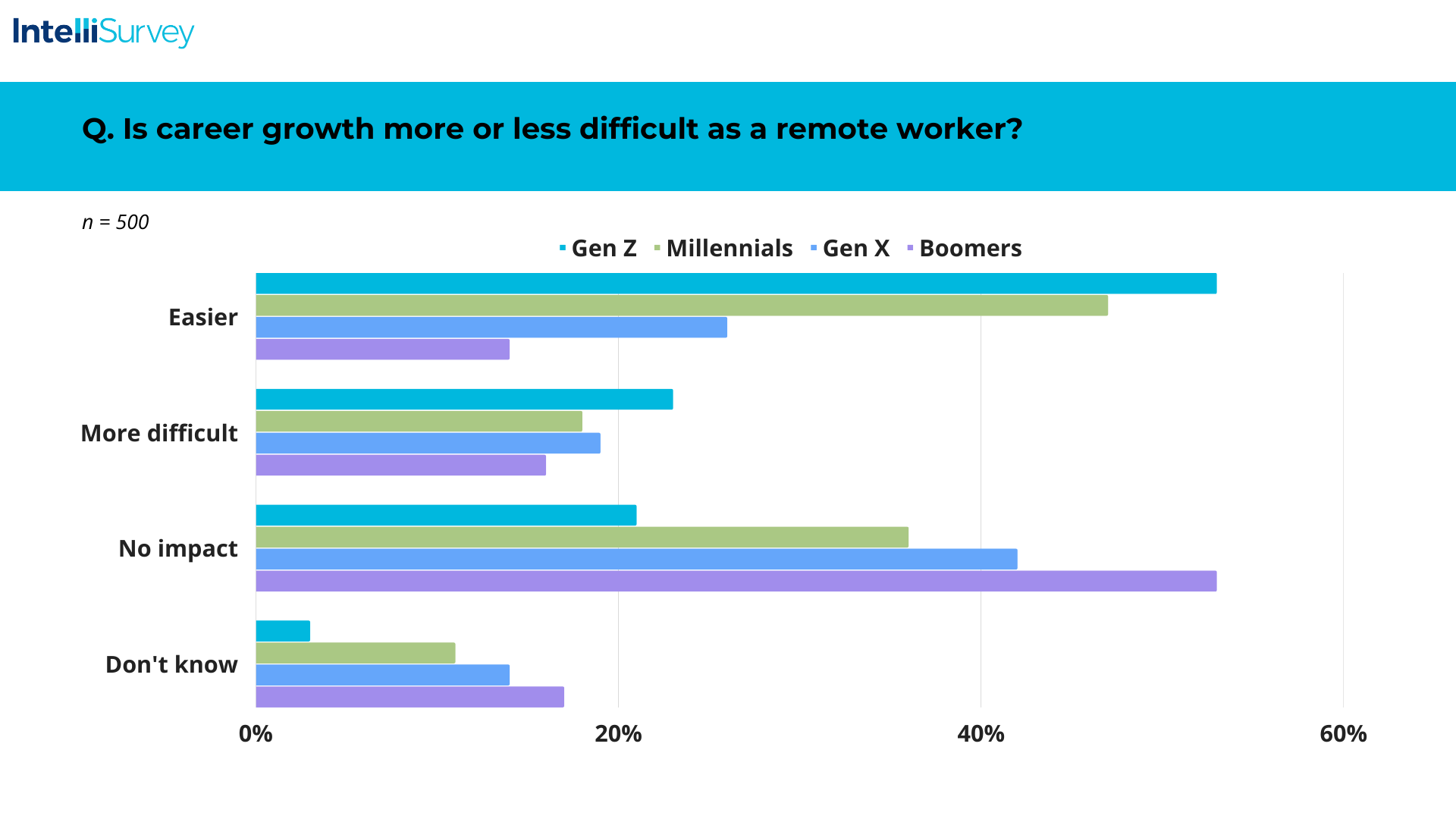
Gen Z is Reluctant to Continue Working Remotely
Despite the positive outlook for career growth, younger respondents remain skeptical of remote work. Gen Z had the lowest agreement rate (58%) when asked about their willingness to continue working remotely. Boomers, on the other hand, expressed a significantly higher enthusiasm (89%).
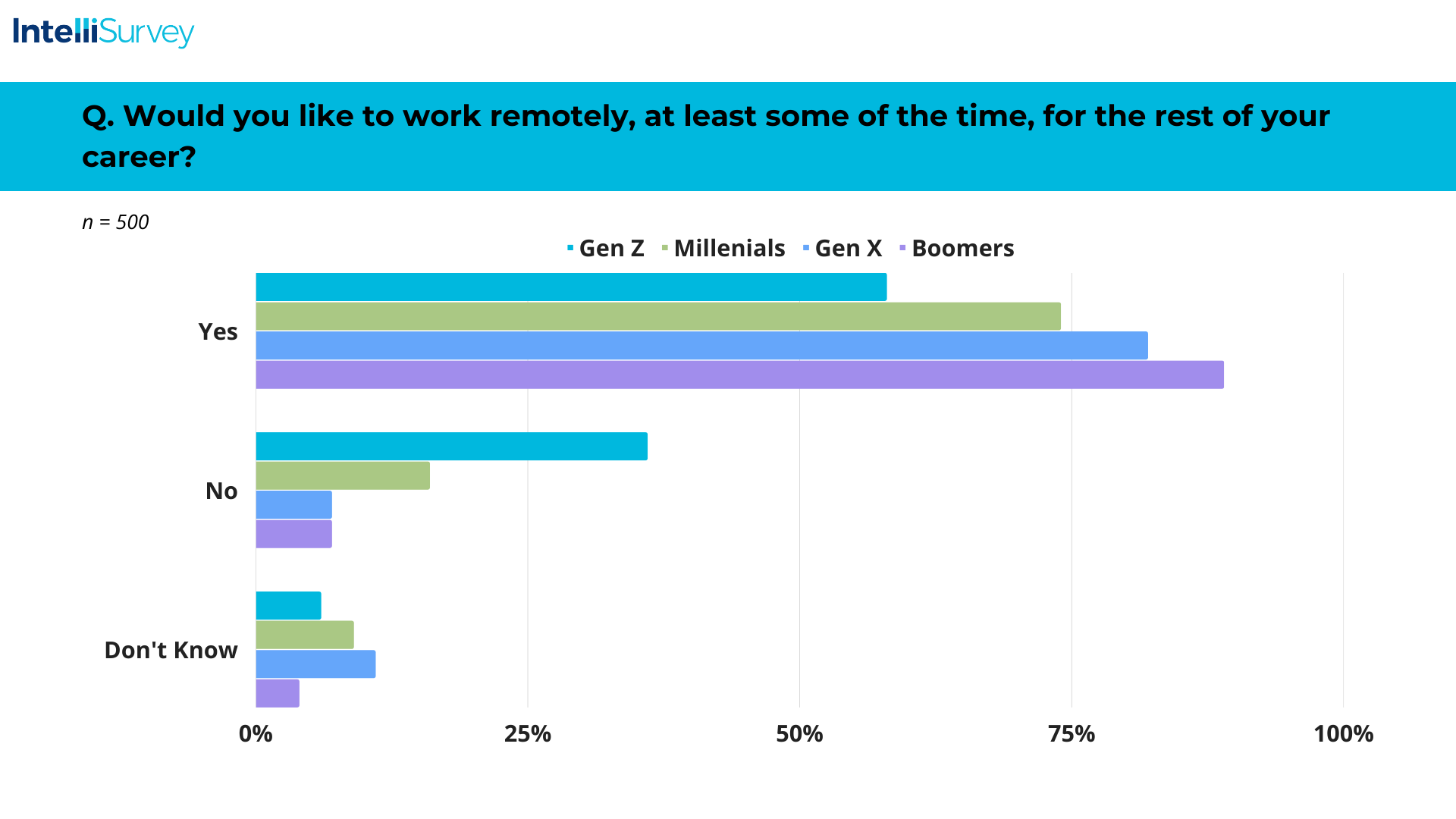
Rethinking Generational Assumptions in Remote Work
Our exploration of generational differences has uncovered a remarkable narrative that challenges conventional wisdom. Intriguingly, it's the older generations, often considered less tech-savvy, who have embraced remote work with open arms and resounding enthusiasm.
The youngest generation, on the other hand, appears significantly disillusioned with remote work. They have the poorest ratings for work/life balance and mental health, the least desire to continue working remotely, and the lowest NPS of all generations.
We suspect these differences are the result of career stages and choices. Many of the older generations chose the remote lifestyle for themselves. After working remotely for 3+ years, they have continued to embrace that choice and enjoy the freedoms associated with virtual employment. They are further down their career path and know what they want.
In the early stages of their employment journey, Gen Z doesn’t have the same base of comparison as the older generations who began their occupations in an office setting with long commutes, set work hours, and limited technology. The future is still unknown to them, with many more possibilities to adapt their work environment to their preferences as they figure them out.
As the workforce evolves and adapts, it's essential to move beyond generational stereotypes and recognize that remote work can resonate (or not) with people from all walks of life and age groups. Employers and organizations should leverage these insights to create flexible work environments that cater to their diverse workforce's unique needs and preferences.
How IntelliSurvey Can Help
To make work accessible and adaptable to all, organizations need tools to gather real-time feedback and turn it into actionable insights. If you’re looking for a partner to build and manage your next employee engagement, satisfaction, or other workplace study, please get in touch.



